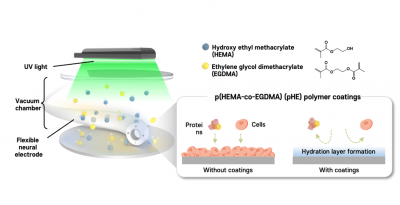Science
Innovative Coating Technology Triples Lifespan of Brain Electrodes

A research team led by Dr. Hyejeong Seong at the Korea Institute of Science and Technology (KIST), in collaboration with Prof. Seongjun Park from Seoul National University, has developed a groundbreaking coating technology that significantly enhances the lifespan of implanted electrodes. This innovation extends the recording duration of brain signals from one month to over three months, a substantial improvement with implications for neurotechnology and medical research.
The team’s findings were announced in March 2024 and represent a major advancement in the field of brain-computer interfaces. By addressing the critical issue of electrode degradation, which has previously limited the effectiveness of long-term monitoring and treatment options, this research opens new avenues for improving patient care in various neurological conditions.
Significance of the Breakthrough
Electrodes are essential for recording brain signals, but their performance typically diminishes rapidly after implantation due to biological responses. The novel coating technology developed by the researchers minimizes this degradation, allowing for more prolonged data collection and potentially more effective treatments for disorders such as epilepsy, Parkinson’s disease, and even stroke recovery.
According to Sang-Rok Oh, president of KIST, this advancement not only enhances the capabilities of existing technologies but also paves the way for new applications in neuroscience. Hong-Lim Ryu, president of Seoul National University, emphasized the collaborative nature of this project, highlighting how interdisciplinary approaches can solve complex challenges in science and medicine.
Future Implications and Applications
The implications of this research extend beyond clinical applications. The ability to record brain signals for extended periods can facilitate more comprehensive studies of brain activity, providing insights into cognitive functions and neurological disorders. Enhanced electrode longevity may also reduce the need for frequent surgeries, thereby lowering healthcare costs and risks associated with invasive procedures.
As the research progresses, the team plans to conduct further studies to refine the coating and test its effectiveness in various clinical settings. The ultimate goal is to integrate this technology into existing neural interfaces, enabling a new era of brain-computer interaction.
This innovative approach marks a promising step forward in neurotechnology, illustrating the potential of scientific collaboration to address pressing health challenges. The research team’s work reflects a commitment to advancing understanding and treatment of neurological conditions, with the potential to improve the quality of life for countless individuals.
-

 Science3 months ago
Science3 months agoALMA Discovers Companion Orbiting Giant Red Star π 1 Gruis
-

 Science3 months ago
Science3 months agoDoctoral Candidate Trivanni Yadav Advances Battery Research at UTulsa
-

 World4 months ago
World4 months agoGlobal Air Forces Ranked by Annual Defense Budgets in 2025
-

 Top Stories4 months ago
Top Stories4 months agoNew ‘Star Trek: Voyager’ Game Demo Released, Players Test Limits
-

 World4 months ago
World4 months agoMass Production of F-35 Fighter Jet Drives Down Costs
-

 Sports3 months ago
Sports3 months agoNASCAR Faces Fan Backlash as Steve Phelps’ Texts Surface
-

 Business4 months ago
Business4 months agoGold Investment Surge: Top Mutual Funds and ETF Alternatives
-

 Top Stories4 months ago
Top Stories4 months agoDirecTV to Launch AI-Driven Ads with User Likenesses in 2026
-

 Politics4 months ago
Politics4 months agoSEVENTEEN’s Mingyu Faces Backlash Over Alcohol Incident at Concert
-

 Science4 months ago
Science4 months agoTime Crystals Revolutionize Quantum Computing Potential
-

 Entertainment4 months ago
Entertainment4 months agoFreeport Art Gallery Transforms Waste into Creative Masterpieces
-

 Science4 months ago
Science4 months agoRemembering David E. Brest: A Life Dedicated to Nature and Family









